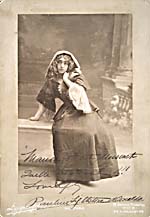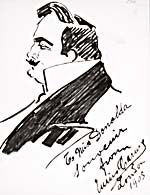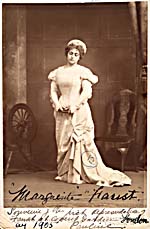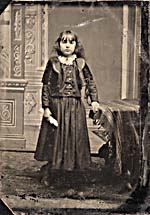Pauline Lightstone Donalda - Early Career

In 1904, Pauline Donalda debuted in the title role of Jules Massenet's Manon, at the Casino Municipal in Nice
After two years of study, Donalda had an opportunity to audition for her first opera role. It was the title role for Jules Massenet's opera Chérubin. Those present at the audition, including Massenet, were greatly impressed by Donalda's performance, but they were reluctant to cast an unknown singer in a lead role. Accordingly, they offered her 7000 francs to be the understudy. Determined to accept only leading roles, Donalda rejected their offer. Soon after, she was approached by the same group and offered the title role in Manon. Massenet, himself, coached Donalda for this production. At the age of 22, Pauline Donalda made her operatic debut as Manon at the Casino Municipal in Nice. A review in Le Phare du littoral described Donalda's first professional endeavour on the operatic stage. "Pauline Donalda dared to appear for the first time before the public in the role of Manon. On a stage where so many Manons have been applauded and feted. On a stage where mediocrity is unknown and where good enough is considered not enough. Only Pauline Donalda could have had that boldness and succeed. She possesses an unusually exquisite physique; a strong, brilliant, flexible and wide-ranged voice; a finesse and intelligence underlined by remarkable acting and sparkling eyes that open to life or are full of love."8
After her successful debut, Donalda's contract in Nice increased from 8 to 17 performances.9 She appeared as Marguerite in Faust, Micaëla in Carmen and Mimi in La Bohème. Under the direction of the composer Ruggiero Leoncavallo, she also sang the roles of Nedda in Pagliacci and Jenny in the French premiere of Chatterton. She continued to receive excellent press reviews and before long, she became known as one of the newest rising stars on the European opera scene.

An announcement for Covent Garden's 1905 production of Mozart's Don Giovanni, featuring Emmy Destinn, Pauline Donalda and Enrico Caruso
Donalda next set her sights on Covent Garden. Her confidence strengthened by her success in Nice, Donalda approached the opera house's artistic director, Andre Messager, sending copies of her Nice reviews and a request for a role. Messager responded positively, offering Donalda a three-year contract that paid her $26 for each performance.10 On May 23, 1905, she debuted at Covent Garden as Micaëla in Bizet's Carmen, with Emmy Destinn in the title role. During her first season at Covent Garden, Donalda also had the opportunity to work with Antonio Scotti and Australian diva Dame Nellie Melba, who became a role model for the young Canadian singer. Her other roles that season included Marguerite in Gounod's Faust, Zerlina in Don Giovanni and Juliette in Gounod's Roméo et Juliette. On June 28, 1905, she sang the leading role of Ah-Joe in the world premiere of Franco Leoni's one-act opera L'Oracolo.
After only a few performances, critics and reviewers began to notice similarities between the vocal style of Donalda and Nellie Melba. A reviewer from The Observer commented that". . . [Donalda's] voice has that peculiar quality of roundness which has ever been noticeable in that of Mme. Melba. In fact, in many other respects the voices are curiously alike as Mme. Melba has been the first to recognise."11
Perhaps it was this similarity with Melba that provided Donalda with one of the most memorable challenges of her career. In June of 1905, Melba was scheduled to perform the role of Mimi with the legendary Neapolitan tenor Enrico Caruso in La Bohème. When Melba suddenly took ill, Donalda was chosen to take her place. Appearing opposite the formidable Caruso was not the only pressure that Donalda faced. She had performed Mimi on previous occasions, but only in French, and she had only four days to learn the part in Italian.
A self-portrait sketched by Enrico Caruso and given to Donalda during a performance of La Bohème
Donalda worked diligently in preparation for the performance and sang so well that during the applause, Caruso ". . . kept pushing her forward to take most of the curtain calls and bows."12 Thereafter, Donalda had the opportunity to sing with Caruso at Covent Garden on numerous occasions, in operas such as Don Giovanni and Rigoletto.
Donalda in the lead role of Marguerite from Gounod's Faust, Covent Garden, 1905
During her first season at Covent Garden, Donalda met another male opera singer who became an important figure in her life -- baritone Paul Seveilhac. He debuted at Covent Garden in 1901 and first performed opposite Donalda in Covent Garden's 1905 production of Gounod's Faust. In an interview with Ruth Brotman, Donalda described her first encounters with the young baritone. "I was introduced to Paul by my good friends the Salignacs. We would often all meet at a French family's home to play poker for a little relaxation. After a few weeks of sitting by and watching, I decided to learn to play the game since I was in love with Seveilhac and wanted to be good company. Actually I had no card sense at all and had little time to learn."13
Seveilhac was of a different faith than Donalda and her parents strongly discouraged their ensuing relationship. Eventually, her troubled personal life coupled with an increasingly hectic performing schedule, began to take its toll. She lost a lot of weight, developed a bad cough and was ordered by her doctor to go to a retreat in the mountains and avoid singing and talking for six months. Donalda followed his instructions, but suffered immensely during this time. Happily, she made a full recovery and never experienced severe chest trouble again. She returned to Covent Garden in April of 1906 and one month later, despite her families' reservations, married Paul Seveilhac.
Donalda was in high demand and over the years, secured many engagements at venues like the Théâtre de la Monnaie in Brussels, Opéra Comique in Paris and the Manhattan Opera Theater. She toured Hungary, Holland, Germany, Ireland, Wales, Scotland, Russia, the United States and Canada, and her repertoire expanded to include roles from Lohengrin, Martha and Pagliacci.
On the advice of Canadian soprano Emma Albani, Donalda also included oratorio and concert appearances in her busy schedule, appearing in oratorios such as Haydn's The Creation and Handel's Messiah, and as a soloist with the Hallé Orchestra, the London Symphony Orchestra and the Liverpool Philharmonic Orchestra.
In addition to her many public performances, Donalda also participated in numerous private concerts that often took place in the homes of London's elite society. Along with musicians like Enrico Caruso, pianist and composer Ignaz Jan Paderewski and violinist Mischa Elman, Donalda performed in the homes of distinguished patrons such as Lady de Gray, Lord Astor and Baron Alfred de Rothschild.14
Donalda also made several recordings between 1907 and 1916, but unfortunately, some of them have been lost or never issued. Donalda destroyed a few of the masters herself, as she generally found the sound of her reproduced voice unsatisfactory. In 1967, Rococo Records of Toronto released a set of recordings that contains seven selections performed by Donalda, including excerpts from Don Giovanni, Faust and La Bohème. Preceding the music is a short introduction in which Donalda says, "I was disillusioned when I heard my records because I did not think they were faithful reproductions of my voice. But I couldn't do anything about it. For the Bohème record, it was the eighth time that I was recording it. I told them 'this is the last time I shall do it'. That's why I did not finish the final phrase."15
When the First World War broke out in 1914, Donalda was visiting Montréal. She did not return to Europe until 1917. These years were difficult for Donalda, as her husband, three brothers and nephew were at the front. In an interview with The American Hebrew, she described how difficult it was for her to continue performing. "I have tried again and again to forget that at any moment, yes, this very moment, one or all of my dear ones may be stricken. I have told myself that my career is at stake, that I must sing. But it has only been now and then, mainly at concerts for the relief of our brave 'Tommies' that I have been able to appear at public performances."16
Thus, Donalda busied herself with charitable activities, namely fundraising through benefit concerts for organizations such as the War Relief Fund, the Patriotic Fund and the Red Cross. She also organized a concert series called the Donalda Sunday Afternoon Concerts, contributing all proceeds to war charities.17
By the time Donalda returned to Europe in 1917, her marriage to Seveilhac was falling apart. They separated, divorced and shortly afterwards, Donalda married Danish tenor Mischa Leon. This marriage also ended some years later. Donalda commented on the difficulties of balancing a singing career and marriage saying, "From my own personal experience, I most certainly do not think a singing career and marriage mix well at all. If a career is to be successful . . . one must be ready to simply give everything, sacrifice everything to it, everything."18
Donalda would sing in the great European opera houses for only five more years after her return to Europe. Her final operatic role was Concepcion in Maurice Ravel's one-act opera L'Heure espagnole. When she retired at the age of forty, she was in her prime, but tired of the hectic schedule and the travel that public performance entailed.
Pauline Lightstone Donalda - Childhood and Education
Pauline Lightstone was born in Montréal on March 5, 1882, the third of eleven children. She later changed her last name to Donalda, in honour of Canadian arts patron Sir Donald A. Smith (Lord Strathcona), who provided generous support throughout her career. Her parents, Michael and Fanny Lightstone, immigrated to Canada around 1868 and were married in Montréal. Michael Lightstone was an amateur singer and he instructed his children in music from an early age. Apparently, Pauline demonstrated musical talent even before she learned to talk -- her mother claimed that she heard her daughter "'cooing' two notes at the age of six months when the organ grinder played outside the family house".1 Her first encounter with the live stage took place at the age of seven, when she played the Queen in a children's production of Cinderella. At the age of ten, she won her first singing prize at the Royal Arthur School in Montréal.2
Donalda's first real "break" occurred in 1901 when, at the age of 19, she was a soloist in a choir that performed at the first Jewish Zion Congress in Montréal. The choir director recognised the young singer's potential and arranged an audition with distinguished pianist and music director of the Royal Victoria College, Clara Lichtenstein. Upon hearing Donalda sing, Lichtenstein remarked, "I think the diamond has been found".3
Thereafter, things progressed very quickly for the young singer. She enrolled in the Royal Victoria College, which awarded her a full scholarship in music and free tuition for general arts courses. Thus, in addition to her studies in vocal repertoire and technique, Donalda studied music history, languages and literature. She was an exemplary and hard-working student, and before long it was evident that she would have to go abroad in order to continue her studies.
Donalda's father, however, was reluctant to allow her to go to Europe without another professional opinion on whether or not she really had a future in opera. Thus, in February of 1902, Donalda headed to New York City, to no less than the Metropolitan Opera (the Met), to seek out another professional opinion. Armed with a card of introduction from Lichtenstein, she first approached Walter Damrosch, conductor for the Metropolitan Opera. She attended one of the maestro's rehearsals and during the break she introduced herself. Donalda later described this disastrous meeting, "What do you think he did? He took the card, looked at it -- then tore it up into pieces and said: 'I have no time to waste on you young girls who think they have voices!' Well, after that rebuff, you can just imagine how I felt. I just sat down and began to cry."4
She regained her spirits, however, and went on to meet the Metropolitan's leading French tenor, Thomas Salignac. He responded enthusiastically to her singing and commented, "Your voice is beautiful and naturally placed, and there isn't any reason why you shouldn't start studying operatic roles right away".5 In addition to Salignac, a jury of experts from the Met also evaluated her voice favourably and reassured by their response, Donalda began to prepare for her journey to Europe.
To help cover her tuition and living expenses in Europe, Lord Strathcona (Sir Donald A. Smith) awarded Donalda a scholarship of $50 per month. Before she left Montréal, Donalda organised a farewell concert at the Royal Victoria College on March 26, 1902. Accompanied by Clara Lichtenstein, she performed songs by Schumann and Brahms, and arias from Mozart's The Marriage of Figaro, Wagner's Tannhäuser and Gounod's Faust. A review of the recital in the Gazette predicted an optimistic future for Donalda: ". . . [T]he lady has a remarkable voice and the careful training that is certain to be obtained in Europe will surely develop it to such an extent that another Canadian prima donna will be, no doubt, the result."6
Donalda arrived in Paris and immediately began studying with Edmond Duverney, a teacher at the Paris Conservatoire. Pierre Breton tutored her in French and she received instruction in Italian from Babette Rosen, who, like Canadian diva Emma Albani, had been a pupil of the famous teacher Francesco Lamperti.7
Pauline Lightstone Donalda - Later Career
Upon her retirement, Donalda opened an impressive teaching studio in Paris, where she taught gifted singers from 1922 until 1937. The studio had excellent acoustics, seating for over 100 people and a stage equipped with lighting, sets and props.19 Well-known composers like Paul Dukas and Vincent D'Indy regularly visited Donalda's studio to hear her students, many of whom developed into talented performers.

Pauline Donalda opened a teaching studio in Montréal in 1937. Many of her students, such as Clarice Carson, Robert Savoie and Fernande Chiocchio, enjoyed international success. In this photograph, she is seen with Robert Savoie
Although most of Donalda's professional experiences and successes had taken place abroad, she expressed a desire to return to Montréal, in order to develop a tradition of first-rate opera performance in that city. Donalda arrived in Montréal in 1937 and by 1941, had helped to found The Opera Guild Inc., an organization whose mandate was "to give concerts, recitals and to perform or to cause to be performed operas, musicals, symphonies and/or musical plays of all kinds or descriptions; to increase the public interest in music of all kinds, [and] to stimulate the public interest in arts and music".20
The first production of the Opera Guild occurred on May 3, 1942, with scenes from Cavalleria Rusticana, Carmen and Il Barbiere di Siviglia. With Donalda as President and Artistic Director, the Guild produced operas for 28 consecutive seasons before it ceased operations in 1970.21 Many Canadian singers like Clarice Carson, Robert Savoie and Maureen Forrester had the opportunity to perform in the 29 different operas presented by the Guild, which included operas by Puccini, Mussorgsky, Prokofiev, Verdi and Mozart.

Pauline Donalda (left) at a reception following the Opera Guild of Montréal's final production. Donalda was president and artistic director of the Guild, which produced 29 different operas in 28 consecutive seasons
In 1966, The Montreal Citizenship Council recognized Donalda with the Outstanding Citizen Award for her leading role in the Opera Guild and her commitment to the development of music in Montréal. She also received an Honorary Doctorate of Music from McGill in 1954 and the Order of Canada (Service Medal) in 1967.22 By the time of her death in 1970, Donalda had spent over 30 years in Montréal and, through her teaching and her involvement with the Guild, had contributed significantly to Montréal's operatic scene.
Donalda attributed much of her success to hard work and a lifelong appreciation of music. She said, "Art is a life study and the study of music exalts life. The voice, besides being a thing of beauty when properly used, is an index to culture. Add personality to hard work and you have the main ingredients of a potential singer. . . . My last words: You must work, work, work!"23
Through her remarkable vocal talent and her unflagging devotion to opera, Pauline Donalda experienced a rich and rewarding life, and touched the lives of opera lovers worldwide.
For more information on Pauline Lightstone Donalda's recordings, please consult the Virtual Gramophone database.
http://www.collectionscanada.gc.ca/gramophone/028011-1055.4-e.html










No comments:
Post a Comment